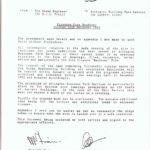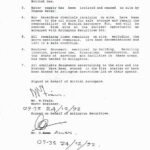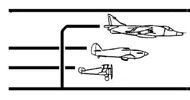| Name: | |
| Michael Frain | |
| Transcript: 10 | |
| Turning the key on 80 years of history | |
The Kingston site finally closed in 1992 and it was the job of Works Engineering to decommission the factory. It fell to Michael to sign the closure papers, on Christmas Eve, handing over the site to Arlingtons, the firm responsible for its demolition. As buildings were reduced to rubble there were people watching in tears from the street. As one ex-Hawker employee wrote to the Surrey Comet, ‘What a blessing Sir Thomas Sopwith did not live to see it’!Could you just finish off by giving us a flavour what it was like actually closing the business down and you were turning the key on eighty years of history really. Quite an emotional time I would have thought? It was. And I think I can start answering that by the notice informing the staff. As a senior executive we were given – we were obviously in briefings with the management about the closure of the site, so we knew beforehand. And then, at a given time we had to go and inform the staff. Now we had to inform them – or we were supposed to inform them by a written letter, a script in other words – and to read from it, which lead a long spiel about the need – and then the announcement of closure of the site. And I looked upon the faces of my staff, my team members, and there was no way I was going to spend ten minutes giving them the reason without what was happening. So I said, I am sorry it is the closure of the Kingston site and here are the reasons. And then read it out. It was no good giving them ten minutes of anguish waiting, probably knowing what was coming. It was, and honestly they were losing their jobs and for some of them they would never work again. They would never be able to find a job that required their skills in the area. So yes, it was a sad time but in my case I had the challenge – another big challenge – for the dismantling and how are we going to dispose of all the stuff. And bearing in mind there were lots of dangerous chemicals and gasses and so on, that all had to be made safe. In the final few months, it became like a ghost town and we had to keep on our toes because there were a lot of dangers. And particularly because we had people that were buying stuff, of dubious reputation. The people that were buying – probably, perhaps ‘cowboys’ and so on – buying stuff at very ‘knock down’ prices and taking it. In fact there was one occasion when a forklift truck was said to have been sold and it was taken out of the gate on a lorry. It hadn’t been sold and it hadn’t been paid for. The chap had chosen the one that was being used, which was a good vehicle – a newish vehicle. He decided to load that onto his vehicle. We had the Police chase him up the motorway. They caught him and it was brought back to the site. So there were all sorts of strange goings-on. The vultures move in. Yes, the vultures move in. And there was a weekend we arranged for all the charities that were registered in Kingston with Kingston Council to come. Anything that was left in the final months, to come and help themselves and they brought their vehicles. Furniture and equipment and so on – good furniture, desks, tables and chairs. It grieved me considerably because there wasn’t much demand for it and so it went up into skips. And we deliberately had to smash it in the skips. And there were people, as I understand it, weeping in the street when, you know, the demolition was taking place. Yes, there were people. And I had staff that had being made – it was a phased redundancy, obviously. Some – we couldn’t keep the whole team right to the very end. So there were people that would come back in tears or certainly upset about the situation. It was a sad time. I was fortunate because I was just fifty at the time so I was still within a time period of being able to think I could get further employment.
|
|




